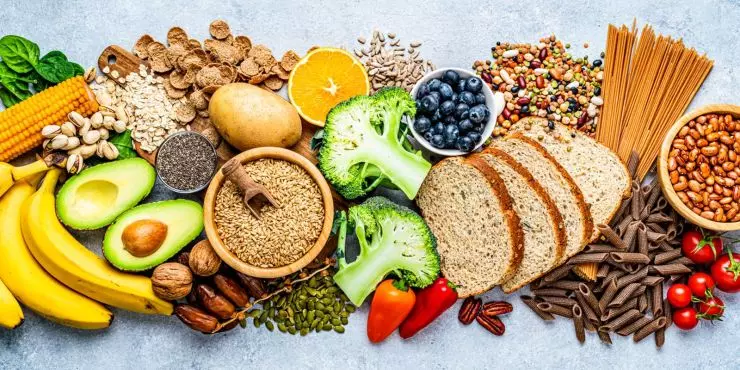
As physicians, we often get asked about nutrition. With so much information on what to eat and what not to eat, it’s no wonder many of us are so confused. What you eat is critical to overall health. There is truth to the saying, “You are what you eat.” Meaning if you eat well, this will support a healthy lifestyle. So, what exactly should we be eating?
Skip the fad diets and the latest trends, and keep it simple. Eat whole-natural foods - it’s really that simple. Whole natural foods refer to foods with little to no processing. It means buying fresh vegetables, fruits, fish, meat, nuts, beans, eggs, dairy, and spices from the grocery store and bringing these foods home to cook into a meal.
Processed foods are all the other foods you can buy in the grocery store. Generally, if it comes in any packaging like a box, jar, or plastic wrap, it’s a processed food. Processed foods have changed whole-natural foods into a more ready-to-eat form by machines or people in a processing plant. They often have added sugar, salt, and chemical preservatives to make them taste better and last longer. Often, these additives are harmful to our bodies.
Moreover, many ingredients within processed foods have been heated to high temperatures to help preserve them longer. Heating often destroys vitamins, enzymes, and proteins essential for good nutrition. Because of this, processed foods often need to be fortified, which is a way to restore the nutrients destroyed during processing.
Cooking whole-natural foods from scratch is the healthiest, most nutritious way to feed our bodies. It is also a fun activity the whole family can participate in.
The 12 Best Foods to Include in Your Daily Diet

So where to begin? Here are 12 of the best foods to include in your daily diet that support a nutritious way of eating and promote overall health.
Leafy Greens: Kale, spinach, collard greens, and Swiss chard are some examples of leafy greens rich in vitamins, minerals, and antioxidants. The health benefits of greens are endless, but to name a few:
- High in vitamins A, C, and K, folate, calcium, and iron
- Packed with antioxidants
- They are good for your heart, containing high levels of potassium and magnesium in leafy greens help to regulate blood pressure and promote heart health
- High in fiber which helps to support digestive health and prevent constipation
- It may reduce the risk of cancers like breast, colon, and prostate
Okay, we know leafy greens are good for us, but if you are like many of us, getting them into your diet is a struggle, especially for those of us with picky eaters at home. That is why we created a guide to getting your family to eat more leafy greens. Read it today!
Berries: Blueberries, strawberries, raspberries, and blackberries are packed with fiber, vitamins, and antioxidants. Not only are these little bundles loaded with excellent nutrients, but they are tasty, too, and can be a great dessert option with no added sugar. Remember, we should all aim to keep added sugar in our diet to under 25 grams daily.
Salmon: Salmon is a rich source of omega-3 fatty acids, which are essential for heart health, brain function, and joint health. Due to its high vitamin content, it also can be good for skin and eye health.
Nuts and Seeds: Almonds, walnuts, pecans, chia seeds, and flaxseeds are excellent sources of healthy fats, fiber, and protein. Healthy fats include monounsaturated and polyunsaturated fats, which can help to lower cholesterol levels and reduce the risk of heart disease.
Whole Grains: Whole grain bread, steel-cut oatmeal, brown rice, and quinoa are good sources of fiber, vitamins, and minerals.
Greek Yogurt: Greek yogurt is a good source of protein and probiotics, which are essential for gut health. We love to replace sour cream in recipes with Greek yogurt as its alternative that is packed with protein.
Avocados: Avocados are a rich source of healthy monounsaturated fats and fiber. This can promote weight loss as it helps you feel fuller. Additionally, avocados contain anti-inflammatory compounds, which may help reduce the risk of chronic diseases.
Cruciferous Vegetables: Broccoli, cauliflower, cabbage, and Brussels sprouts are some examples of cruciferous vegetables high in fiber and vitamins.
Beans and Legumes: Beans, lentils, chickpeas, and black beans are excellent sources of protein, fiber, and vitamins. These are great options for vegetarians looking to get healthy proteins into their diet.
Sweet Potatoes: Sweet potatoes are a good source of complex carbohydrates, fiber, and vitamins. Because of the fiber, they can help you “go” regularly. Sweet potatoes are a healthier, lower-sugar choice than regular potatoes.
Extra Virgin Olive Oil: Extra virgin olive oil is a healthy fat and an excellent source of antioxidants. Additionally, it is a good source of polyphenols, which have been shown to positively impact blood pressure levels.
Herbs and Spices: Herbs and spices like turmeric, ginger, garlic, thyme, cinnamon, clove, and rosemary are high in antioxidants and add flavor to your food. These are also great alternatives for salt to add flavor to your food.
Struggling With Diet and Weight?
We are here for support. We proudly offer nutritional and weight loss counseling to help you achieve your goals. At our Plymouth location, Dr. Juma is certified in Obesity Medicine and offers in-depth sessions to optimize your weight loss success. Talk to your physician today to learn how to improve your nutrition and live healthier.